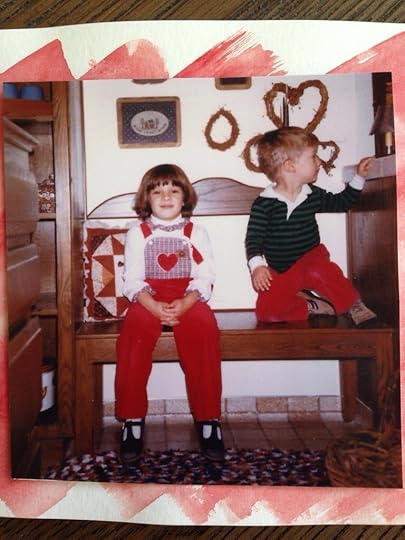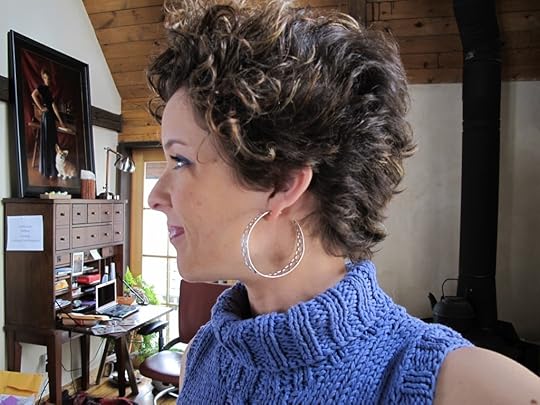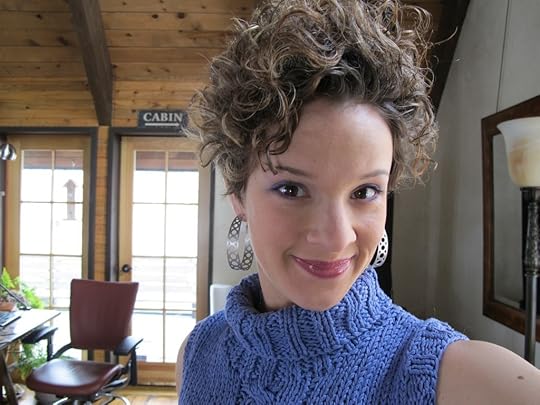Jonalyn Fincher's Blog, page 9
June 25, 2014
Debbie Downer Fixer Uppers
Some people have no trouble taking care of themselves, so you don’t need to read this.
Now, to the rest of you….
I have good friends who have bad days. The brave ones reach out and call. Pretty soon, I offer a few ideas of what might cheer them up. Maybe you can even add to my list with your favorite Debbie-Downer-Fixer-Uppers.
Bring her cupcakes
Write him a card with a quote from a favorite book they’d love
Spring for getting drinks after work
Set up a phone date and share a quote from some amazing author.
Suggest a movie night
Text them a new song to listen to
Visit and take their kids on a walk so they have 30 min of quiet
But when it comes to my own downer days, I have a different list. The most striking feature is that all the empathy and nurturing that comes out with friends disappears when it comes to me. Instead of taking care of myself, I work harder.
Obsessively check emails
Cross-off more on my to-do list
Make dinner in a whirlwind
Clean the house faster
Don’t look out the window and breathe (no time)
Don’t take a walk (no time!)
But this has changed for me.
And in keeping with our summer of spirituality, let me introduce you to an exercise that has allowed me to enjoy the person God made, the person who springs to help others, but is just learning to help herself.
I met with an exercise by Brené Brown during her e-Course through The Gifts of Imperfection. This exercise helped me apply my own fixer-upper ability to myself. As my friend and psychologist, Dr. Sal puts it in this Emerald City, “If we do not learn to take care of ourselves, we give up that job to someone else” (from “Is it Okay to Love Myself?“).
Brown recommends finding a picture of ourselves when we were young. Choose carefully, she says, find a picture that recalls something you loved about your childhood. This will be easier for some of us than other.
I found that picture. Here it is pasted into my journal. I’m sitting relaxed next to my brother during what appears to be what I must imagine is a Valentine’s party.
After some questions about noticing, appreciating, and wondering what makes this little person’s light shine, Brown recommends we ask, “What can you do to take care of her?”
Suddenly, I saw the connection between the skills of taking care of others and taking care of myself. This ability to nurture others has, for years, been cut off from me. It’s like some creepy poser-Christian doctrine has taught me that other people’s needs matter more than mine. This is somewhat easy for a conservatively raised Christian woman to believe if you only memorize verses like Philippians 2:3 and forget how our Savior left the needy to tend to his own soul at night, sometimes leaving the multitudes to simply talk with God by himself (Mark 1:35). And good God, we are not the saviors of this world.
My care wasn’t just for others, it’s for Jonalyn, too.
So, when I notice my head pounding after a particularly hard personal conversation, or a grueling Emerald City interview, or an unpleasant travel experience, instead of working harder (which is my shaming/coping mechanism), I ask myself,
If a friend called me with a day like this, what would I suggest they do to take care of themselves?
Tea, chocolate, movie, a walk, definitely time to put the work away and let the house be, maybe pick up that novel, order take-out, watch the clouds move, and face doing less to do more for myself.
What do you need permission to do to take care of yourself?
Sometimes I simply need to remember that Jonalyn is worth caring for, that my headache is worth paying attention to and not muting the pounding with a Motrin.
Recently, I took another off-roading trip with my husband and son. Off-roading is probably one of the most unpleasant ways for me to vacation. I can barely resist putting “vacation” in quotes, because I honestly don’t see how jostling my body over barren rocks for hours upon hours just to rush out the next morning to do it again counts as a vacation. I just don’t see it.
But I married a man and have raised a son who differ from me. And I’m practicing differentiation with them (more on differentiation in an upcoming post). However, this last trip we went out “vacationing” (I can’t help it, the quotes spring unbidden from my fingers) in a 4 x 4 vehicle that was made to bounce and bang. So that’s what we did, for an interminable five hours with the freezing wind whipping our facing, freezing our hands, driving me nearly insane so that by the time we went home I was teetering between two options.
I could let my husband know just what I thought of his vacation and blame-shift my pain onto his back.
or
I could take care of myself.
I announced my plan as we pulled in the driveway, “I need a hot bath and quiet for AT LEAST an hour. Can you take care of the little guy?”
Dale was swiftly nodding, rather amazed that I was clearly articulating my needs for myself and taking care of myself.
In less than five minutes, I was soaking up the steam in the shower. Twenty minutes later I was watching one of my favorite British murder mysteries. Within an hour, I was restored to being able to laugh about the day. I had cared for myself, trusting my intuition about what I needed, leaning into the care I pour out so easily on others.
Are you able to pour your own care into yourself?
What’s your favorite fixer-upper for a Debbie-Downer day?
June 18, 2014
What Do I Want
I’m surprised how many Christians, even men and women in leadership, don’t know what they want.
We know what we’re supposed to want – to serve or to lead, as we are female or male (respectively). But when we face doing something apart from the herd of sheep we must figure out WHY, why am I separating from the herd? And this takes self-awareness, which precious few Christians cultivate. So instead, we stall, or even worse, we fill our schedules so thick we cannot think about what we want.
In this summer of spiritual practices, there is one discipline that has taught me to notice what I want, a Christian discipline I had never heard about, but one that has walked me out of dungeon of codependency and into the fields of freedom.
This practice, which St. Ignatius dubbed the examen (see The Spiritual Exercises), was introduced to me by the charismatic Catholic family of Dennis, Sheila and Matthew Linn through their simple, short book Sleeping With Bread: Holding What Gives You Life. St. Ignatius believed God would speak through our deepest feelings and yearnings, what he called “consolation” and “desolation.” Through the examen’s questions (and there are only two) I began to practice self awareness as a way to worship the God who made me on purpose THIS way.
But it’s not just St. Ignatius who believed God wanted our deepest desires and fears. Jesus said, “Blessed are you when you hunger and thirst for righteousness” (Matthew 5:6). David wrote, “My soul longs for you, my flesh yearns for you, in a dry and weary land where there is no water” (Ps 63:1). Jesus appealed to what gave us life when he said to the woman at the well, “But whoever drinks of the water that I will give him shall never thirst; but the water that I will give him will become in him a well of water springing up to eternal life” (John 4:14). Our desires lead us to the way we were made to be.
The Examen, for such an intense name, involved only two simple questions. I ask them of myself in the evening.
1 – For what moment today am I most grateful?
2 – For what moment today am I least grateful?
Already, I have my favorite question. For me, I can much more easily find what makes me grateful than what makes me least grateful. For my husband, he’d prefer starting with his least grateful moment.
Start with the question that feels easiest.
And there are many other ways to ask these same questions. The Linn’s suggest the following adaptations. Choose the one that is easiest for you to identify the answer.
When did I give and receive the most love today?
When did I give and receive the least love today?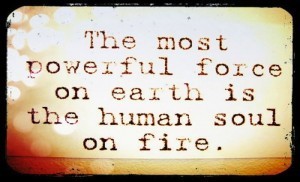
When did I feel the most alive today?
When did I most feel life draining out of me?
When today did I have the greatest sense of belonging to myself, others, God and the universe?
When did I have the least sense of belonging?
When was I happiest today?
When was I saddest?
What was today’s high point?
What was today’s low point?
I started practicing the Examen last year, when a friend (thank you Elisabeth M) recommended the book. I had already enjoyed the Linn’s work (Healing Spiritual Abuse and Religious Addiction) but now this book offered a chance to notice more closely who I was made to be. I made surprising and heartening discoveries.
I learned that I slip into codependency like an addict, but that the examen would shine a light into those moments. My codependent moments were always my saddest moments of the day, the times I felt the least sense of belonging. Codependency requires that I distort the truth of who I am in any way to please others, to meet expectations of who I should be or what I should feel. Even the smallest lie can disorient me into forgetting who Jonalyn was made to be. The examen re-calibrates me every night to remember the truth about who I am and what I need.
I learned that I’d rather have a messy house full of people I love than a clean house that is empty of company. Growing up my family prized tidiness so until this year (it took me 34 years!) I have fretted before and after company because of the state of the house. And my husband will tell you, our house was never, ever in any “state” to be worried over.  The examen opened up my least grateful moment when I realized, “I felt the most life draining out of me when I worried that the wine stains on the chair were somehow a reflection on ME. But I didn’t really care that the wine spilled, besides, we all got to work together to get it cleaned up. ” My most grateful moment was seeing all those friends around our table. I realized that fearing what would happen to my house was not a reflection of me, but a reflection of someone else.
The examen opened up my least grateful moment when I realized, “I felt the most life draining out of me when I worried that the wine stains on the chair were somehow a reflection on ME. But I didn’t really care that the wine spilled, besides, we all got to work together to get it cleaned up. ” My most grateful moment was seeing all those friends around our table. I realized that fearing what would happen to my house was not a reflection of me, but a reflection of someone else.
I learned I don’t like sitting with other people’s (or my own) least grateful moment. I want to solve it. But the Examen has taught me that life-draining moments are not always Jonalyn material to solve. They’re material, certainly, but God has work to do without me tidying up.
I learned that patterns emerge of what I want and what I do not want. This practice has helped me realize who my dearest friends are, what I treasured most when I went into surgery last week, what I needed, what I did not want, what makes me come alive, what deadens me, and what God’s sealed orders are for me on this earth.
No small benefit.
A few notes on how to practice the Examen (from Sleeping with Bread)
Before answering the questions, put your hand on your heart and ask Jesus or God as you understand God to bring to your heart the moment today for which you are most grateful. If you could relive one moment, which one would it be? Ask yourself what was said and done in that moment that made it so special. Breathe in the gratitude you felt and receive life again from that moment.
Ask God to bring to your heart the moment today for which you were least able to give and receive love. Ask yourself what was said and done in that moment that made it so difficult. Be with whatever you feel without trying to change or fix it in any way. You may wish to take deep breaths and let God’s love fill you just as you are.
Do practice this with your spouse or children. The examen has the ability to teach children to trust themselves, to know that God is in all reality, not just out there or in church, or theology, but in themselves. It teaches us to trust that we know what gives life and what doesn’t.
Two books I recommend to keep practicing
Sleeping with Bread: Holding What Gives You Life – read this review of how this book changed Camber, one of our fav babysitters and Soulation assistant.
Let Your Life Speak: Listening for the Voice of Vocation by Parker J. Palmer one of the best books for learning to not wear other people’s faces.
June 11, 2014
My Hair is My Glory
In keeping with our summer of spirituality, Savvy Wolfson kicks us off with a dynamite post about the importance of our body, even our hair, to our relationship with God. For all those who grew up hearing “Your hair is your glory” and that short hair is “unnatural” this is a post for you.
~~~
One of the most freeing things I have ever done for myself was to get a haircut. A simple haircut. Looking at my reflection afterwards, I knew I was finally representing myself—like the person inside of me was making her first appearance on the outside. There in the mirror was a woman who was strong, empathetic, bold, young, and maybe a little sassy.
What had I been representing before? Fear. Fear of people’s opinions, my father, my brothers, of being unattractive, unsubmissive, and perhaps even “emasculating” men. What I had been told my entire life was that women with short hair had ruined their image, and that made me sad. I never had a problem with long hair, but it just wasn’t me. When I looked at pixie cuts on other women, I envied something I found positively gorgeous. On the one hand, I longed for a piece of their courage, and on the other, I pitied that they were now sadly unattractive to any man in their life. My brother’s words rang in my ears. “Even if a man says he likes short hair, he’s just being nice. No man really prefers a woman with short hair.”
Flipping through fashion magazines one day, I gazed at a woman with long, dark curls that reached to her hips and felt wistful, for I knew she was perfect. I knew I wasn’t and that I never could be, because my hair wouldn’t look like that without hours of styling (which I was too clueless to pull off). So when I started questioning, I first asked why the woman in that magazine was perfect. “Because all men like long hair,” my inner voice answered. The next question was, if that lie were true, does it matter? “Yes.” Why? “Because women should defer to men, represent men, and please men.” Ahhh, there was the real crux of my problem. Recently, #YesAllWomen has shown us that these beliefs are the norm of our culture, and I was no exception. I was shrinking to my church, family, and culture’s beliefs about my identity, rather than rising to God’s beliefs about me.
 When my own daughter’s hair became long enough to brush, the questioning began in my soul. I had already cut my hair as short as I dared (above my shoulders, but still over my ears), and I felt happier than ever with it. But Dayenu, at 16 months old, could not have cared less about how her hair looked. She did hate having it brushed, though. Thankfully, around that time, Willow Smith shaved her head. Her entire head. When everyone wanted to know what on earth her mother was thinking, Jada Pinkett-Smith made a statement that changed my life. She said,
When my own daughter’s hair became long enough to brush, the questioning began in my soul. I had already cut my hair as short as I dared (above my shoulders, but still over my ears), and I felt happier than ever with it. But Dayenu, at 16 months old, could not have cared less about how her hair looked. She did hate having it brushed, though. Thankfully, around that time, Willow Smith shaved her head. Her entire head. When everyone wanted to know what on earth her mother was thinking, Jada Pinkett-Smith made a statement that changed my life. She said,
“This is a world where women, girls are constantly reminded that they don’t belong to themselves; that their bodies are not their own, nor their power or self determination… Willow cut her hair because her beauty, her value, her worth is not measured by the length of her hair. It’s also a statement that claims that even little girls have the RIGHT to own themselves and should not be a slave to even their mother’s deepest insecurities, hopes and desires. Even little girls should not be a slave to the preconceived ideas of what a culture believes a little girl should be.”
I knew what I had to do. I gave my baby girl her first haircut, and while I miss those beautiful baby curls, I don’t miss the tears that came along with caring for them. When I look at her now, I see her. I see spunk, life, and passion.
But what about me? From childhood and on through college, I kept growing my hair out and cutting it, simply because I didn’t know what to do with it. It was thick and heavy and just…hung there.

I didn’t even want my hair in this photo, but the photographer wouldn’t let me put it behind my back. I tried to sweep it back over my shoulders and she assumed I just loved having hair so uniquely long and hurried over to arrange it so it would be prominent. Such a good visual for me to see how far I’ve come.
Once I pinpointed the lies and truths, I was ready to move forward with my life. You might think I marched into the salon with a chip on my shoulder, but I was really rather nervous. I wrung my hands, I cringed when the clippers made their first trail up the back of my head, pondering whether they should only ever be used on boys. “It’s too late now!” a woman called across the room, reading my thoughts perfectly. When it was all done, I looked up and met my own eyes. I had a sense of “I finally did something I wanted with my body,” and “This will take some getting used to” at the same time. As soon as I had finished inspecting it, my eyes went to the pile of brown, dead fluff on the floor. I stood up and smiled as my hair got swept into the trash along with my chains. And within a few hours, I really was used to it because it felt like how I’d always wanted my head to feel.

Dayenu’s haircut
Ever since that haircut, I’ve spent my days ever since with a lot more respect and love when I catch my own eye in the mirror and nod at the woman I’ve become. She’s a woman who reaches back and retrieves what is hers.
~~~
Savvy’s postcript, “I would like to invite other women to share their stories about what their hair means to them. I know I’m not the only one who feels like my hair is very significant to me. Would you share in the comments? I know we could have a lovely conversation.
One more photo from Savvy’s continuing story:
Savvy Wolfson is an empathizing, tree-hugging, lucky in love, play-at-home mom to two under two. She’s also a faithful supporter of Soulation and a friend.
~~~
I also took a trip into the freedom of cutting my hair quite a bit shorter. Here is my faux hawk, ventured one month after my son was born. I loved the lightness, the ease, the way helmets came on and off. I recommend it to anyone who wants to mark a change in their life.
For those who are not sure how to determine where their desires start and their significant others end, for those who don’t know how to own that living, curving, pliable and demanding body they have, look for next week: the examen, a spiritual practice that has helped me discover what I want.
June 4, 2014
#YesAllWomen and Invitation to Tears Read-Along
Last month, my husband, my son, and I traveled to Hilo, Hawai’i where we rented a renovated sugar shack. Our little place was one block from the beach and the farmer’s market. This month has become my favorite vacation. The Coqui frogs sang us to sleep and the rain woke us to work. Dale and I began a new book project, enjoyed being with dear friends, and living like locals in Hawai’i’s complex culture.
Below, you’ll find a few of my favorite pictures.
This week, back at my desk, watching the aspen green and the oak bud, I feel like summer is awakening my hunger for freedom. Our first SoulGym is finishing up, Dale and I are putting together new initiatives for FreeAtLast on recovering from and advocating to end spiritual abuse. And, I have been hearing and reading about #YesAllWomen.
How do we bring freedom to others when we’re just stepping into freedom ourselves? How do we change the way men engage women and women engage themselves? How do we change from the inside so that we’re not so afraid of how big we can be, how daring our body, our soul, our life can become?
Last weekend, I found another way to re-enter my body’s strength. It was so simple.
I corralled my son and set up shop to stain our ancient, gigantic deck. Endurance and laughter bubbled over in me, especially watching my son’s haphazard technique. It was Huckleberry Finn helping me whitewash the fence. And in the sweat and oil-base muck I found courage to put my big girl pants on and endure. I am the woman who stains decks with my four-year-old and makes a splendid, sloppy mess of it.
Staining the deck is just a metaphor, though it really did happen. Our bodies are part of the answer to #YesAllWomen, our bodies hold the memory of the pain we have faced, they hold the power to walk into freedom. But are we awake to our body’s strength, our soul’s magnitude? This is where the spiritual life gives us power.
Henri J. M. Nouwen writes, “The spiritual life does not remove us from the world but leads us deeper into it.” (thanks to Tara Owens and her blog Anam Cara for this quote).
I want to connect you to the spiritual practices that have walked me into freedom, led me into courage to speak and write about sexuality, gender, equality in marriage and cross-sex friendship.
Starting next week, RubySlippers will host a series on spiritual formation. But this won’t be your run of the mill disciplines. I want to share the spiritual formation that I use regularly. Gleaned from my reading, thinking, late night conversations with my philosopher husband and my own wrestling. This summer look for a refresher series on what has made me more fully human.
Feasting
Humility
Courage
Rest
Play
Self-care
Curiosity
Body (look for a post next week on the spirituality of hair cuts)
Intimacy (and that doesn’t simply mean sex)
Grief
We’ll finish off with a month soaking in one of the most overlooked and vital disciplines for modern Americans: grief. Especially appropriate given all that #YesAllWomen shares with us.
Read-Along
It’s the first time I’ve done this, but since I love book clubs, I thought, THIS would be a great way to learn to face what grief means, and all with a company of friends.
This August, join us right here at RubySlippers blog for a free 8-week online Invitation to Tears read-along from 8/1/14 through 9/24/14. As you read, I hope you’ll have thoughts and questions. You can comment with your questions starting August 1 at RubySlippers, or email your confidential Invitation to Tears Questions: mail(at)soulation(dot)org (It’s written out this way to prevent spam).
Each week I’ll share my response in audio form. These podcasts will include a few of my favorite passages from that week’s chapter and answers to you questions. I’ll answer as many as I can in a weekly audio available for free on my blog.
You will have the option of listening to the audio on your computer, or downloading the podcast to your iPod or phone. You can either visit RubySlippers.org weekly or you can subscribe to my blog posts here (at top right of screen) to have posts sent to your email inbox.
There are no real-time requirements – you can can listen at your convenience. You don’t have to be in town, you don’t even have to make it every week, but if you’re interested in reading Invitation to Tears along with me, asking questions that I will personally answer in a podcast, then you’ll want to join us.
The read-along will conclude and be removed from online access September 26. If you want to stay on our schedule, order your copy of Invitation to Tears to prepare for our start date August 6.
And for the video lovers… here’s a few sneak peaks from Invitation to Tears for you to enjoy. Watch as Aubrie Hills and I catch up (you can hear the sounds of Hilo, Hawai’i in the background) on why we wrote Invitation to Tears and what grief taught us about becoming more fully human.
Lessons Learned From Our Grief (3 min)
If you’re reading this post via email, click here to watch the video.
Does Pain Make You Stronger? (3 min)
If you’re reading this post via email, click here to watch the video.
Why are Two Young Women Talking about Death? (2 min)
If you’re reading this post via email, click here to watch the video.
If you’d like to simply listen as you workout or drive, you can enjoy the full hour interview with Aubrie Hills visit iTunes for the free audio version.
Invitation to Tears Read-Along Schedule
Pages 6 – 11 | August 6 | Forward + Introduction
Pages 12 – 19 | August 13 | Chapter 1
Pages 20 – 28 | August 20 | Chapter 2
Pages 29 – 40 | August 27 | Chapter 3
Pages 41 – 54 | September 3 | Chapter 4
Pages 55 – 65 | September 10 | Chapter 5
Pages 66 – 77 | September 17 | Chapter 6
Looking forward to your thoughts and questions during our Summer of Spirituality.
And now, as promised, some pictures from Hawai’i. These capture the delight we packed into one month (for more on the spiritual practice of delight and how it faces off with misogyny “If You Love Skinny Boys“).

Dale’s Coffee Shop Conversation on spiritual abuse and suffering. I watched our son and listened.
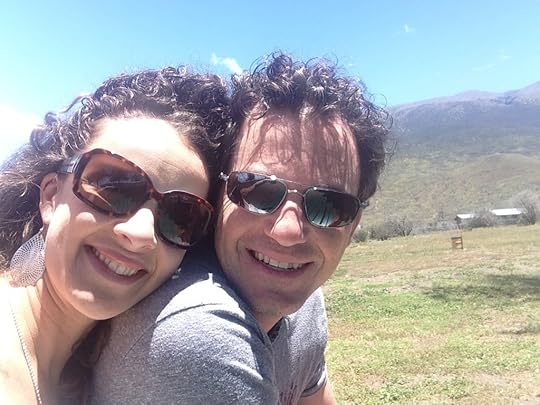
With Dale before we drove up to Mauna Kea observatory.
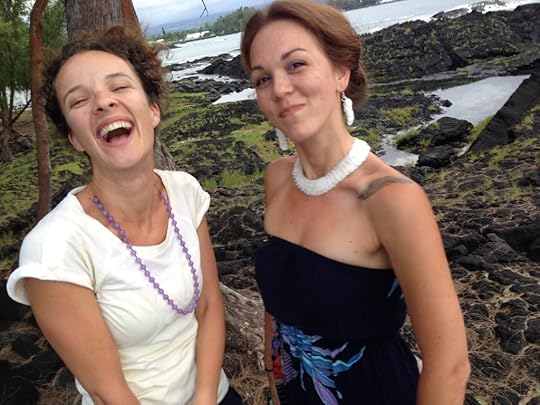
Clowning with Amy

Mother’s Day Present from Kaneko’s and Dale: Paddleboarding lessons in the ocean. Guess who fell?

Walking the Lava Caves

Cooking on our 2 burner stove in our renovated sugar shack at The Lotus.

My four-year-old took this picture. Akaka Falls in the background.

Waipi’o Valley and its black sand beach

Kayaking in Kona

Farmer’s Market treasures from the day.

After a particularly draining day, my headache cleared when my son and I hiked out to this breaker wall.

These are the men who build me stronger. These are the men I grow strong.
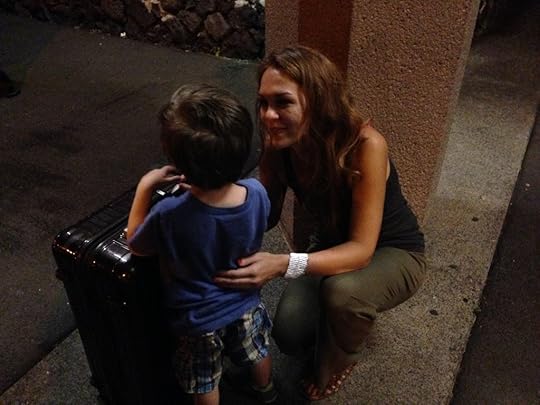
Saying good-bye.
May 11, 2014
A Gathering About Cross-Sex Friendship
I’m enjoying a soul workout with nearly 50 friends at our first SoulGym for the next five weeks, so I’m taking a month off from writing at RubySlippers.
Last month’s series on cross-sex friendship left many of you thinking deeper about friendship. For those who are still interested in going deeper, I’d like to invite you to Soulation’s GREEN Gathering. For five beautiful, refreshing days in July, 10 souls will join Dale and me in Steamboat.
Together we will challenge the gender myths that separate us, clarify what marriage can and cannot do in the church and world, and build up a theology of cross-sex-friendship.
The firm deadline to apply is three days from today (Wednesday, May 14).
All are welcome to attend, whether you are egalitarian, complimentarian, or still figuring it all out!
A little glimpse at what you’ll get:
More information on the Soulation Gathering page.
Dale and I would be honored to have you join us.
May 7, 2014
SoulGym FAQ Questions
I’ll be taking a month off from RubySlippers this May and heading to Soulation’s SoulGym with many of you.
This SoulGym on sharing “Spiritual Truth Without Spiritual Arrogance” just started. We’d love for you to get your soul healthy with us.
It’s not too late to join. Registration stays open until the end of this week.
~~~
We’ve received several questions about the course so I thought it might be helpful to do a quick FAQ.

The most asked question about Soulation’s new eCourse:
About how much time will this course take each week?
If you are a moderate-fast reader, the course should take between two to three hours per week. If you are a slower reader, plan to spend up to four hours per week. This does not include weeks that you will participate in one optional one-hour Ask Live sessions or one-hour live webinars.
What is the weekly course outline?
On Sunday you’ll receive our weekly Workout Schedule because SoulGym is all about working out your soul. This includes your weekly reading and video assignments.
On Monday morning, you’ll receive, in your inbox, a journal prompt from Jonalyn to explore.
Tuesday or Wednesday, you can choose to sign up for an optional one-on-one spiritual mentoring with Dale or Jonalyn. This is your time to explore any deeper issue in a more confidential atmosphere.
Thursdays are our Show and Tell with Classmates (#SoulGym). You can take pictures of your journal and share them with the tag #SoulGym on fb or twitter. You can see what each other are doing. We cannot wait to see your journals. Dale and Jonalyn will be sharing theirs.
Then on Fridays it’s time to begin to rest for Sabbath. We’ll be teaching you how to rest along with us.
Every couple of Saturdays during the class, we have a live Q and A. Dale and Jonalyn will be taking your questions live, we will also collect them beforehand. You’ll see students in the class and interact with the Finchers. You’ll get to hear Dale and Jonalyn share some of the insider, vulnerable stories and we’ll laugh together over how challenging and rewarding sharing our faith can be.

Sneak peak from inside SoulGym Day 2.
What is the format of the course? Am I required to be present at specific hours or times?
This is an at your own pace style course. Once unlocked at the beginning of each week, the course materials will be accessible online until June 20.
You can do everything on one day or spread it out day by day. SoulGym is an eCourse at your own pace. There are only two live webinars during the course. If you are unable to attend these live webinars, they will also be recorded and accessible at your leisure online.
When does the course start and end?
The first course material will be available on Sunday, May 4th. We have a rest week (for catch up) from May 18-24. The last week of class wraps up on Saturday, June 7th.
What is Ask Live all about? Is it mandatory?
Ask Live is your chance for private, confidential spiritual mentoring with Dale or Jonalyn. This is an optional, one-on-one internet chat (typing, not face-to-face), which we hope will enrich our time together.
Appointments are first-come, first-served and last one hour. When the spots available are full, we are unable to offer any more, so please sign up as soon as you are able. You will find a link to sign up in your “You’re In!” welcome email.
Do you offer refunds?
You are welcome to take the eCourse risk-free for the first three days (May 4-7). Let us know by the end of Tuesday, May 7, if you would like to discontinue the eCourse, and we will issue a refund.
Who should take this eCourse?
“Spiritual Truth Without Spiritual Arrogance” is perfect for any person who cares about sharing the life they enjoy with Jesus with others–in passing conversations or within deep relationships. Anyone from a mature junior high student to a retiree would enjoy this interactive, multi-faceted eCourse.
Do you have any tips for groups taking this eCourse together?
Yes! This course is perfect for:
Church Bible study or evangelism groups
Supplemental training for ministry groups (think college campus organizations, youth group teams, etc)
You and your best friend who want to grow together even though you’re far apart
You may choose any part of the course to do with your group. If you’re all free on Mondays, get together (or set up a video chat!) to watch Dale and Jonalyn’s 20-minute intro video, read the assigned sections from the book, talk about what you’ve learned, and pray for a great start to the week. Or, if you want to do something creative together in the middle of the week, watch Jonalyn’s journal prompt together, then break out your journals and paints to create.
How can I purchase this course as a gift?
It’s easy! When you make the payment here just add a note at checkout with the following information:
Gift for [Name of participant]
Email of participant
Whether you’ve informed the participant about the course gift
If you want us to send the welcome email to you so that you can send it to the participant, please indicate that as well. We don’t want to ruin any surprises!
What materials are required for this course?
Coffee Shop Conversations: Making the Most of Spiritual Small Talk
Journal (watercolor paper suggested)
Watercolors, sharpies, markers, or colored pencils (or any other supplies that you use to be creative)
Am I required to participate in comment thread and live webinar discussion or can I just be an observer?
You are not required to participate in discussions. Observing discussions is just as valued as participating vocally.
When are the live webinars?
The live webinars will take place on May 17, 9-10pm ET and June 7, 9-10pm ET. These dates are tentative, but you will be notified two weeks in advance if we need to change anything.
~~~
I hope you can join us. Dale and I have learned so many new things about sharing our faith since designing and practicing for this time together. You don’t need to be an artist or a scholar to join SoulGym – all of us struggle with wondering if we’re “ready” to delve deeper. But we can learn so much and find so much freedom as a community.
Click here for more details about SoulGym
April 30, 2014
Define Emotional Affair
I keep getting asked about the ingredients of an emotional affair.
But, before we talk about emotional affairs (and there’s plenty to talk about), it’s time for the results of your poll.
The most popular question you want answered was . . . “How do I deal with sexual energy and beauty in guy/girl friendships?”
So to answer your question, I give you another short video (complete with enthusiastic facial expressions) from my interview with Dan Brennan. I also have plans to cover this question in more detail in the coming months. For those who voted for another question, I have good news for you (look under the video).
Every question in the poll has been answered and is available in audio at iTunes.
These question and answers make up some of the best ideas from this Emerald City with Dan Brennan. You can choose the answer to your question or purchase the whole conversation. My favorite one, “How do I stay above reproach? is Track 4. Thank you to Dan Brennan, Trever Klingenmeier, and Sarah Kappen for contributing and compiling this work.
Finally, one short announcement. For the month of May, I’ll be taking a one month leave-of-absence to devote my time to Soulation’s inaugural SoulGym. This eCourse will introduce you to Soulation’s online community as we all learn about how to share “Spiritual Truth without Spiritual Arrogance.”
If you’d like to join us it’s not too late to sign up.
I’ll be back June 4th with some fun insider scoop on my most recent book, Invitation to Tears: A Guide on Grieving Well (now available in Kindle and paperback at Amazon).
Let me know if you’d like to join my read-along.
~~~
Define Emotional Affair
After some provocative questions from Happy, a real life emotional affair from a friend, and the original concern from Mary DeMuth, I’ve decided to compile what I’ve heard and let you add you two cents. This will the the concluding post on cross-sex friendships for this month of April. Thank you to those who have followed, voted, commented and encouraged me through this subject.
Let me open by saying the idea of an “emotional affair” sort of scares me. I’m frightened by it because I really don’t understand it. And I’m afraid that because I’m an emotionally intense person I may have committed an emotional affair without knowing it.
That’s why I don’t like the term: it’s vague in my mind. But, perhaps, that’s simply because I haven’t studied it enough. Or, perhaps it’s because the concept is complicated
I’ll let you judge. I do offer my own attempt at a definition of an emotional affair at the end.
~~~
Questions from Happy that affirmed many of my own questions (from the comments last week):
I think my question about “emotional affairs” would be – is that even really a thing, or is it a term “we” made up to define something potentially dangerous? In my reading of Scripture, my understanding is that adultery = sex with someone you’re not married to. That doesn’t say anything about emotions, tho maybe it’s implied. I do believe that it is possible to be unfaithful to one’s spouse in other ways, too, but I’m not sure that any other kind of unfaithfulness would be possible only in married relationships specifically.
I can “cheat” on a friend by divulging their secrets, or disrespecting them. I can tell them I care about them deeply and then be unkind by not noticing what they’re going thru or by not hearing what they are trying to say. I can be unfaithful to a friend by not showing up when they need me. But the only way I can think of that I could be unfaithful to a spouse in which I couldn’t also be unfaithful to a friend is about sex… Unless I am missing something completely….?
Webster defines an affair as a sexual relationship outside of marriage, over a certain span of time. So what exactly IS an “emotional” affair? I wonder sometimes if it isn’t a term we’ve invented out of fear: “if I *feel* something “too” strongly (whatever that means), it’s possible that it could turn *into* ‘something more’ that would lead to adultery – so it would be better to steer away from intensity of feeling altogether.” I don’t know. Wise boundaries specific to specific relationships are …well, wise. But I hear fear in the words “emotional affair” – fear that strong emotion will lead somewhere it shouldn’t – and I’m not sure that preventing ourselves from feeling – or fearing intensity of emotions – serves us well.
Just some thoughts and honest questions….
~~~
My friend, A, made a good case for why the term is confusing. She offers a key word in understanding what an emotional affair is.
I think “emotional affair” is very vague. A common thought or definition is that an emotional affair is having an emotionally intimate relationship with someone outside of our marriage. But if that’s true, then most friendships are emotional affairs. This “any emotional intimate relationship is an emotional affair” is a broad and flimsy definition, and applies to any emotionally intense person. As humans bearing God’s image we are wired to connect with multiple people on multiple levels… not just one person.
So are we hardwired for emotional affairs?
We need to define an emotional affair more clearly, maybe “betrayal of exclusivity.” In the context of a marriage, betrayal of exclusivity would mean a spouse is replacing the value of their spouse with the value of another. It’s not the addition of the value of another because it’s perfectly good, healthy and beautiful to open ourselves up to another person’s value. But replacing our spouse’s worth with another’s worth, key word REPLACING. So, replacing your spouse’s beauty with another’s, replacing their power, replacing the impact of their soul.
~~~
But to round out these questions and suggestions, I offer you this poignant, real life example of an emotional affair experienced by my friend:
Yes, an “emotional affair” is a real thing, and it’s just as destructive and just as devastating as a technically adulterous (i.e., physical/sexual) affair is to a marriage. An emotional affair is characterized by the following (I will share as if the husband is the one committing the emotional affair):
A husband becomes emotionally entangled with another person by getting involved in her problems and her life in emotionally intimate ways;
The spouse then prefers the other woman to his wife and elevates the other woman above his wife, making decisions that hurt his wife in order to support the other woman;
The spouse continues to behave that way and ridicules his wife for feeling slighted and degraded and especially, disregarded;
The spouse threatens–often–to leave his wife if she won’t let him keep the other woman as a close friend;
The spouse then DOES leave his wife for that close friend.
And all the while–the whole time–the spouse insists the relationship is not physical/sexual, and at least on that note, he seems to be telling the truth.
Is this sin? Yes, absolutely, it is. An emotional affair creates behavior that is as damaging and destructive to a relationship and to emotional & physical health as a regular adulterous affair wreaks.
Cross-sex friendships for married people are really hurtful and dangerous when the spouse connects with the friend on a deeper, more intimate level than he does with his wife . The connection then becomes sinful, as the spouse prefers the friend to his wife .
Cross-sex friendships are fine as long as they don’t cross such boundaries, but I believe the focus of married couples should be to seek out friends who can’t and don’t pose such threats to their marriages.
~~~
Dan Brennan also shared some thoughts about his trouble with the phrase (from comments last week):
I struggle with language to call something that is truly an unhealthy disruptive force within marital fidelity. “Emotional affair?” “Emotional infidelity?” “Emotional purity?” What constitutes an unhealthy disruption to marital trust?
The tricky or challenging thing is the whole issue of what emotional/spiritual depth looks like that is “exclusive” within marriage and what does healthy emotional/spiritual depth look like shared between friends who are married but not to each other or at least one of them is married (friendship between married and a single).
At first glance, of course, in our contemporary evangelical view of things there is this great rush to protect all emotional/spiritual depth to be exclusive within marriage. But then, at a closer look, there are significant New Testament threads (and the sibling bond/metaphor is a very rich counter-proposal to that) which invite us to more. We need moral discernment. It doesn’t follow that all significant emotional/spiritual depth over the course of time is a violation of marital trust and fidelity.
I can’t help but quote Mary DeMuth‘s powerful insight. I’m going to take it out of immediate context but it so applies to the question:
“Restoration meddles with what they’ve learned to handle,
removes what they’ve learned to live with, bestows what they’ve learned to live
without. In short, we become adept at living with a gaping wound. It’s our
comfortable place, what we embrace as our lot in life. Dysfunction is our safe
place; it’s what is knowable and navigable. The prospect of healing frightens
us because we don’t know what it
looks like. Living
with freedom would be new,
different—
alien to the way we’ve conducted our lives until this moment.”
Not Marked, by Mary DeMuth
In my own life and journey as a married man in this, I’ve come to see that married people must be aware of internally comparing the beauty of their friend’s strengths with the weaknesses of their spouse . This is a clear boundary we much exercise very early on in relationship. A significant part of owning and maintaining your spouse’s beauty (keeping their whole embodied presence within the marital bond) is to not engage with surrendering that beauty for your friend’s strengths. It’s a healthy and beautiful thing to recognize and even to come to rejoice that your friend’s beauty attracts you in ways, stirs you in ways, meets your needs in ways that your spouse’s beauty doesn’t–because they’re two different, profoundly unique beautiful people bearing witness to God’s beauty within them and in your life. To be able to appreciate both while maintaining an appropriate distinction is huge: one is your covenanted spouse and the other is your friend–even close friend, is to mirror the BEST and closest adult sibling bonds where one or both are married.
We have to exercise a healthy caution up front with the possibility of rushing into emotional-spiritual sharing of great depth. A great chemistry connection is one thing; intimate sharing of emotional/spiritual depth up front is risky business. Intimacy takes time and trust and if we don’t respect that we will leave ourselves vulnerable. That’s not to say we can’t suddenly find our self in a context in which we trust our instinct and it feels appropriate to share our hearts about something with a new relational movement, it just means we have to nurture an ongoing prudence to developing the discipline of intimacy that honors our marital trust.
So here are my thoughts in 2 short paragraphs
An emotional affair requires more than emotional closeness. For instance, if a woman shares a secret that only her closest friends (including her spouse) know and she decides to share this secret with her close guy friend, she has not entered into an emotional affair. For if this were true, then sharing secrets between opposite sex siblings would also be taboo.
Emotional affairs seem to be essentially about what you do with your power for intimacy. Emotional affairs require that you cheat on the power your spouse deserves and siphon it off to someone else. Married people owe a significant measure of intimacy to their spouse. For how can you make love and be faithful romantically unless you spend a good deal of your power for intimacy on your spouse?! So with this definition a single woman cannot have an emotional affair in the same way a married woman can.
My stab at a definition.
An emotional affair = removing your power for intimacy that belongs to your spouse, and giving it to someone else.
I’m still left with these questions
Does an emotional affair always require two people? Or can you have a one-sided affair?
Can single people have emotional affairs?
Can you have an emotional affair with non-persons, like with your video games, or romance novels, or your smart phone?
What about an intellectual or spiritual affair?
Is it fair to call an emotional affair, an affair? Are we sexualizing something that is not sexual?
A penny for YOUR thoughts . . .
April 25, 2014
My Vision for Cross Sex Friendships
To illustrate my vision, I will rely on the words of a man. Should you like to see how this applies to women, simply replace “feminine” with “masculine” and “sisters” with “brothers.”
I am indebted to the kindness of my friend, Ryan Thomas Neace who recently shared these lines from Carlo Carretto (1910-1988), a Catholic priest in the order of “The Little Brothers of Jesus”. He penned these lines five years before his death at age 78.
I share Carretto’s vision of moving forward because I believe in it.
NB: at the end of this passage, Carretto talks quite a bit about kissing. I want to be clear that this is brother/sisterly kissing. For American society, this would be cheek kissing (not making out!), as I’ve learned they practice in Hawai’i among families. It reminds me of the way I kiss my grandpa or uncle whenever I greet them.
This is a holy kiss.
My favorite lines below are bolded.
Please share your favorite lines and questions in the comments.
~~~
It has always pained me when religious men, seized with terror at the danger they incur through woman’s presence, throw up walls and build impenetrable screens. And worse, close their hearts.
How could [woman not show up again in my existence] if I wanted to be a part of the Church and live in the Church? How could I shut out half the human race? And how could I dismiss the possibility of loving so many sublime creatures?
…And yet…It did not take me long to learn that the first dreams fell to pieces once an imprudence was committed, and that a community collapsed once relationships between its elements became equivocal.
And the reason was always the same. Someone had sought to pluck a blossom from the flower bed. Another had been hasty and insisted on tasting the bitter fruit. Above all, men had given rein to their selfishness and turned love of woman into a hunting preserve.
In some places, I remember, I have seen naves of churches divided down the middle, with women on the left and men on the right. As if naves sufficed to separate material explosive as that and designed to be together from dawn to dusk!
We still have a problem, it is clear – a big problem not to be underestimated, and in trying to solve it we must each recognize our own weaknesses and failures.
Even so, we must not turn back and rebuild walls of separation we had in the past. That would be impossible, and anachronistic as well.
We must go forward, even if it hurts, convinced that the times of a grown-up faith are upon us and that this problem not only has negative aspects but extremely positive and valuable ones too.
I have tried to go forward.
I have associated woman with my efforts to realize the Kingdom.
I have made a habit out of reading the word of God with her.
I have tried to succour the poor and handicapped by using her arms, which are more expert than mine.
I have given her my trust, and when she has given me her friendship, I have tried to concentrate on my attention on her personality rather than on her body.
But what brought me to the final solution of the problem was the deep-rooted, deeply experienced consideration that woman, all women, were not my brides but my sisters.
It may seem a small thing, but it was a big thing.
My love for my sisters helped me to understand, and resolve within myself, love for woman, and to tame it without diminishing it.
I had never really understood the words of the Song of Songs, ‘Oh, that you were my sister…I could kiss you without people thinking ill of me’ (Cf. Song 8:1)
Now I understand, and I try to live that way.
Woman, all women, are my sisters.
I am no longer frightened by their bodies; their femininity leaves me serene.
No longer does their friendship disturb or weaken me.
I can even kiss them, if my kiss is brotherly, as Scripture says.
Yes, there is a kiss that shocks and a kiss that does not shock. And the kiss of a sister does not shock; it helps you live…
–Carlo Carretto, 1983, I Sought and I Found
April 23, 2014
Are Cross-Sex Friendships Too Risky?
This week, in a twitter conversation I heard this common concern again, “Why take the risk of a cross-sex friendship?”
The man said, ”Marriage is hard enough without the extra distractions.” The woman said, ”Major marital problems can grow from a single seed of doubt–so why plant an unnecessary seed?”

Read the entire conversation by clicking this photo.
I tweeted back in defense of male/female friendship along with @TrinaKLee (you can see the whole conversation here). But I was left feeling dismayed at how easy it was to dismiss the richness of cross-sex friendships with a simple word . . . risk.
Was I just a crazy risk taker against the safety of other lans?
There is a prevalent idea in our culture that cross-sex friendships are unnecessary risks. I’m sure you’ve heard it. Religious News Service correspondent, Sarah Pulliam Bailey, recently tweeted this Baptist senior pastor’s advice:
“If you’re a man, don’t get in a car with woman who is not your wife unless she’s your mother’s age. @KieBowman #erlcsummit”
Before I delve in, I want to be clear that if a couple needs to call off private opposite sex friendship until they get strong, that is fine. It may be what works best for them in this season. However, I have concern that this aversion to male/female friendship is becoming THE godly example we all are supposed to follow.
If we look at this statistically, we know better. All relationships (same-sex friends, marriage, family) are incredibly risky. Let’s just look at marriage. A little under half of marriages end in divorce, which is traumatic for your heart, not to speak of your economic assets, your health, your friendships, your church, your community, your routine, even your home. Your reputation can be severely harmed by your spouse walking out on you, you can lose your job, your children. Marriage is also risky, health-wise, especially for women. Domestic abuse ranks as one of the biggest threat to women’s lives.
But we don’t have a problem advocating marriage, despite its risks. We enshrine it so highly that gay people want access even to this incredibly risky institution. The intimacy and constant communion with an equal brings so much goodness it’s worth the risk.
Any husband or wife knows about the risk of knowing and being known. Many of you take those risks every day.
But some of us prefer certainty. We cling to it as if it can save our souls. Some of us even think Jesus wants to save us from risk.
A Word on Certainty
Who doesn’t have questions about cross-sex friendships? I do.
Questions point to our discomfort bubbling up as we discover this new freedom. It’s like the deep end of the pool is open for us, but we want to know what that means. We know people can drown out there. So we ask . . .

Harry and Sally were wrong about a few things. Click this photo to learn more.
What does a cross-sex friendship mean?
How will it look in a year?
Where will we go?
What will my spouse think?
What will people think?
Many of you shared your most pressing question in the poll from two weeks ago (it’s not too late to vote).
But in asking questions of cross- sex friendships, we need to question our own skepticism. Is our hunger for answers masking our own fear of being known? Don’t some of us feel like marriage paid the debt we owe to interacting with the opposite sex? And now, we can dismiss the rest of the women (or men) out there as threats to our marriage.
(dust hands off and move on).
Sometimes we demand certainty because we are afraid of taking personal responsibility. Or we hunt for certainty because we so deeply crave safety. And since cross-sex friendships are certainly not risk-free, we avoid them.
Demanding certainty so we can guarantee safety often absolves us from making commitment. For instance
“Until I’m completely certain I will not befriend a woman (or man)” or
“If I ever feel jealous or insecure or badly about myself because of my wife’s friendship with him, then I’m putting the kibash on what they have” or
“I will not commit to loving a friend of the opposite sex, unless I can be guaranteed it will never threaten my spouse.”
Demanding certainty so we can have safety can sound so moral, truly godly. We can even use our spouse as justification as in “My wife loves my boundaries so that’s all the approval I need.”
But since when did following Jesus mean we don’t take risks? Even pushing our loved ones to grow?
This doesn’t mean being foolish. But it does mean that “It’s risky” isn’t enough reason to avoid the idea. We take risks when we think we can get a greater return, when we know our life has the kind of capital to invest more.
I believe that those who cannot spend time with the opposite sex may be actually weaker (not stronger). And after living for decades in the backwater where the weaker brother controls all the permission slips, I’m ready for a wider metropolis.
The lack of self control by some should no longer dictate the standards for those of us who want to grow in obedience in this area. I can honor the private needs for some couples to not have cross-sex friendships, but let’s not make that the Christian standard for all couples.
For me, cross-sex friendships are part of how God is calling me to be obedient. Some are not strong enough to obey in this area. However, this is area I am trying to obey God. To those who cannot engage in opposite sex friendships please do not make moral prescriptions against my obedience because you are afraid of risk.
Finally, since we follow Jesus who met women alone to talk, who let women befriend, hug, anoint him, I know we have big footprints, risky footprints to follow.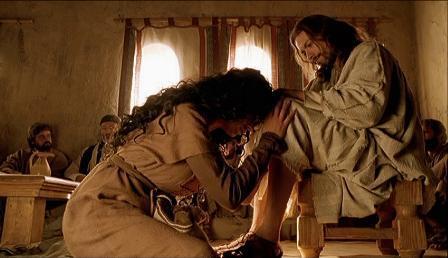
To love is to take risk.
So, are cross-sex friendships too risky?
Of course they are. But not more than marriage.
But, wait a second, you might ask, God supports marriage. Where do you see God supporting guy/girl friendships?
Take a moment to read the passages that talk about brothers and sisters (my favorites: Acts 28:14, Hebrews 13:1, 1 Timothy 5:1-2) in the body. The same Bible that talks about loving our spouses talks about loving our brothers and sisters, treating them with tenderness, spending a week at a time together, seeking them out for our care and attention. We cannot cherry-pick these commands.
And how do you love a brother or sister?
Look at your family. We do not love by distance or a constant chaperone, or requiring that I only hang out with Tom when his wife Tina is present. Not unless I have personal weakness with sex (and newsflash, not all of us turn noticing a hot body into planning to bang a hot body. If you do, then you have a personal issue with self-control).
We do not love by avoidance, or refusing to meet someone’s eyes.
But lust, you might say, adultery, ruined marriages, failed communities, and all because of men and women spending time alone.
First, I no longer believe it is inevitable for men and women to start making out and ripping their clothes off if they spend time alone together. Last week, a guy friend of mine saw me come into our house. He left the guys group to come over and ask me questions about my upcoming trip. He drew up a chair and we shared a tiny smart Phone screen to scope out places he loved to visit. His legs kept bumping my chair.
But he is my brother in this body of Jesus. I felt grateful for the time to talk. I didn’t want to be his lover (the very idea has me wanting to whip around and say, “For Christ sakes (literally!) what’s wrong with you… he’s my BROTHER!), I want to be his sister without insinuations. Our friendship has stood against the test of time. And I am grateful.
Second, to insist that two healthy, kind, intentional friends are forbidden from connection alone unless they be of the same sex, I ask,
“Is that how you treat the brothers in your family?”
Most opposite sex sibling friendships have these ingredients in common. And, I would argue, they are all healthy and proper:
Longing to know and connect
Hope to get and give attention, to be seen
Bubbling excitement for time together
Curiosity about what he or she is doing
Hope to not offend or mess things up
Hunger to serve
Eagerness to share whatever drew us together
Desire to make him or her laugh out loud.
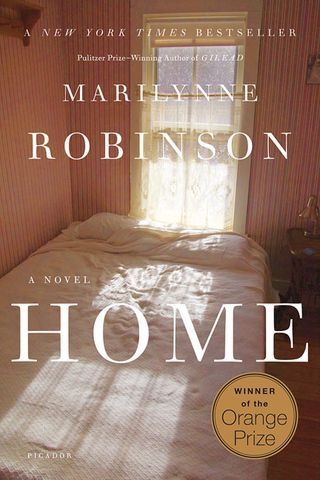 And we all go through stages in our love for the men (or women) in our lives. We often start, like blood siblings, with a childhood awe. For instance, in Marilynne Robinson’s novel Home, Glory and her brother Jack (the black sheep of the family) re-make their friendship. As they care for their ailing father, Glory remembers the way her love grew and changed for all her brothers.
And we all go through stages in our love for the men (or women) in our lives. We often start, like blood siblings, with a childhood awe. For instance, in Marilynne Robinson’s novel Home, Glory and her brother Jack (the black sheep of the family) re-make their friendship. As they care for their ailing father, Glory remembers the way her love grew and changed for all her brothers.
Brothers. When she was a child, attention from any of her brothers was wonderful to her. It was rare, and it was wry, odd, not at all parental . . . When any of her brothers noticed her, it was to swing her around by her hands or to carry her on his back or to show her a card trick or the husk of a cicada. They were vain of their freedom and their manhood, of their cleverness and their long legs, but gentlemanly all the same, and vain of that, too. . . and she was in awe of them. Seeing Jack reminded her of those days. She knew the others now, after the manner of adult friendship. And fond as she was of them, it was hard to remember that they had ever seemed marvelous to her (p 70-71).
I believe that all cross-sex friendships go through a childhood, then adolescence, then (if they’re blessed) an adult stage, much like that between blood siblings.
If you cannot befriend your sibling, we don’t say that you’re protecting your marriage. Rather, we say that if you struggle because you fear you will objectify them, if you cannot look into their eyes to listen and to love, perhaps you have a weakness in this area.
We are all weak in places.
But do you enshrine this weakness with rules to prevent you from ever knowing a sister? Or do you place those weaknesses in the hands of our Savior? If you are avoiding the opposite sex ask yourself why? What is Jesus calling you to?
How are you meeting Jesus to will and to work for His good pleasure by asking him to make you new?
For me, friendship was the cure, not the fuel for my lust.
But, if we are willing to take risks for marriage, because we know there are big payoffs, then we cannot insist brother/sister friends are too risky.
For there are great payoffs as well.
My Vision
The biggest payoff that I know of is that God has the power to heal the Darwinian divide that says “You are only valuable to me if I can mate with you.” God has a better way.
We cannot work for the kingdom of God while dropping our eyes when a beautiful member of the opposite sex asks us a question.
Here’s what I want. Freedom to let those strong in friendships to befriend their siblings in this kingdom.
This Friday, a bonus post on my vision for what cross-sex friendships can be (including some interesting ideas about kisses).
April 16, 2014
She is Such a Flirt
As part of RubySlippers’ month devoted to exploring guy/girl friendships, I’ve invited Beth Bramstedt, pastor, wife and mother, to explain what flirting does and does not mean. She offers us the chance of being playful in healthy opposite gender friendships without objectifying or dehumanizing the men (or women) we love.
If you haven’t yet, be sure to vote on your most pressing “guy/girl friendship” question.
~~~
It all started with a harmless comment in a tweet. It came from a friend, teasing me about being subdued and proper. It was innocent enough, but it got me all riled up! I fired back “Hey now – I am full of surprises!”
 Subdued and proper were fighting words. They reminded me of characters from a Jane Austen novel and represented the scared, ashamed, wounded part of me. I wanted words that described the transformed, alive, awake side of me. Even in that moment, I yearned for a description that reflected my true self, my soul, the person God created me to be.
Subdued and proper were fighting words. They reminded me of characters from a Jane Austen novel and represented the scared, ashamed, wounded part of me. I wanted words that described the transformed, alive, awake side of me. Even in that moment, I yearned for a description that reflected my true self, my soul, the person God created me to be.
Well, those words came. Not through Twitter, but through a tool called the Enneagram – a system of transformational psychology that describes nine basic personality types and their relationship to one another. Through the Enneagram, God encouraged me to embrace three very powerful words – playful, affectionate and engaging. Words that reflect him and his goodness, and are part of the unique way that I reflect his nature to the world. Those words rang true. I was inspired.
And so I began the journey of casting aside my fear and living out my identity in Christ. I started embracing my playful, affectionate, engaging self. I set about climbing trees, line dancing, sliding and swinging, singing and teasing. I began working out and lost 25 pounds. I decided to wear fun clothes that fit, complete with lace and sequins and cowboy boots. As I gained confidence, I became more comfortable in my skin. The witty things I was thinking actually came out of my mouth or over social media. Even my body language opened up, and I found myself smiling fully and without reservation. I had embraced a new part of my true self, and I felt free!
Interestingly enough, my playfulness was interpreted by some as flirtatious.
What I knew as convergence, others saw as a mid-life crisis.
I have a friend who encountered a similar problem. She describes herself as friendly and vivacious, and was accused by a sister in Christ of flirting.
“This was devastating to me,” she shared. “This meant that at my core and in my authentic self, I was unappealing and unacceptable to her. Doing what I was gifted by God to do, and being who I was created to be, was actually frowned upon.”
I understood completely. I also felt judged by my brothers and sisters in Christ, even some who I thought knew me well. They interpreted my truest, most God-given qualities as flirting, and labeled them inappropriate and irresponsible. I fought back feelings of shame, as if there were something wrong with me for treating both men and women, young and old, married or single, as if they were cherished and treasured by God, and by me.
I discovered that “subdued” and “proper” were much safer words, especially for a pastor. When I more openly engaged in behaviors intended to convey that others were valuable, even loved, it made those watching uncomfortable. Whether it is a touch on the arm, the use of affectionate language or simply listening intently, my motivations and actions were often questioned and interpreted as having romantic intent.
In a Christian culture tainted with the notion that one human relationship (marriage) can meet all our needs for friendship, emotional connection, passion, spiritual, recreational and all other forms of intimacy, these more expressive qualities of our God are often cloaked in fear and defined as dangerous. Playful, affectionate and engaging have been thrown into the definition of flirting and have been given suggestive overtones they were never intended to have. So I have found myself desiring to define these terms and redeem them for the glory of God, for other women, and for my sanity!
To me, flirting means suggestive teasing without the intent to know. It is most often a shallow, hollow alternative to playful engagement. It tends to be self-serving and attention-getting, without real commitment or an honest connection to the other person. Or as my friend describes, flirting is acting with the intent to be desired physically by someone.
At its extreme, flirting is Barney Stinson in “How I Met Your Mother” chatting up the girl at the bar. It’s the waitress in the diner painting on the smile to increase her tips. It’s David on the roof gazing at Bathsheba.
Flirting stands in stark contrast to the kind of playful teasing that’s done in the pursuit of knowing or the context of being known. Playful engagement is rich, life-giving interaction that seeks to add or give value to the other person. It is affirming and encouraging and gives voice to the truest parts about us.
Playful engagement shows up in TV partnerships like Castle and Beckett or Kensi and Deeks.
We live out playful engagement when we steal each other’s French fries or walk down the street laughing, teasing, and elbowing each other. We also experience playful engagement from God when he shows up in surprising, unexpected, even silly ways.
While flirting isn’t wrong in and of itself, it can be inappropriate and unwise in many circumstances. So how can you be sure you are choosing playful engagement over flirting? Here are a few questions I ask myself:
Are my words and actions calling out value in the other person?
Do I have a desire to honestly know the other person – the whole, real, messy person?
Do I act this way in my other relationships – with my family and other friends? Is it natural?
Are my actions a true extension of God’s character? Am I reflecting God with my behavior?
If the answer to these questions is “no,” I have probably ventured over into flirting and should honestly check my motives. But when I know my answers are “yes,” then I can live boldly and courageously into my words. I can be loving and tender, pleasing and charming, spirited and full of fun. And I should.
So when a friend asks if using a winky face  in a text to a male friend is flirting, I can confidently say no.
in a text to a male friend is flirting, I can confidently say no.
Or when one of my brothers in Christ tweets #myhero after I lend him my phone charger during the Super Bowl, I can respond freely knowing that my playfulness comes as a result of an admonition given by Paul centuries ago.
“We are many parts of one body, and we all belong to each other… Don’t just pretend to love others. Love each other with genuine affection.”
~~~
Beth is a fan of country music, wife to Chris and mother of two boys. She serves as an Associate Pastor for Woodcrest Chapel in Columbia, Missouri, where she was recently ordained as the first female pastor and works passionately to remove the barriers that keep people from becoming all that God created them to be. She lives in Columbia, Missouri.
Come explore more questions like these with us, July 16-20, in Steamboat Springs, Colorado.
Jonalyn Fincher's Blog
- Jonalyn Fincher's profile
- 9 followers


